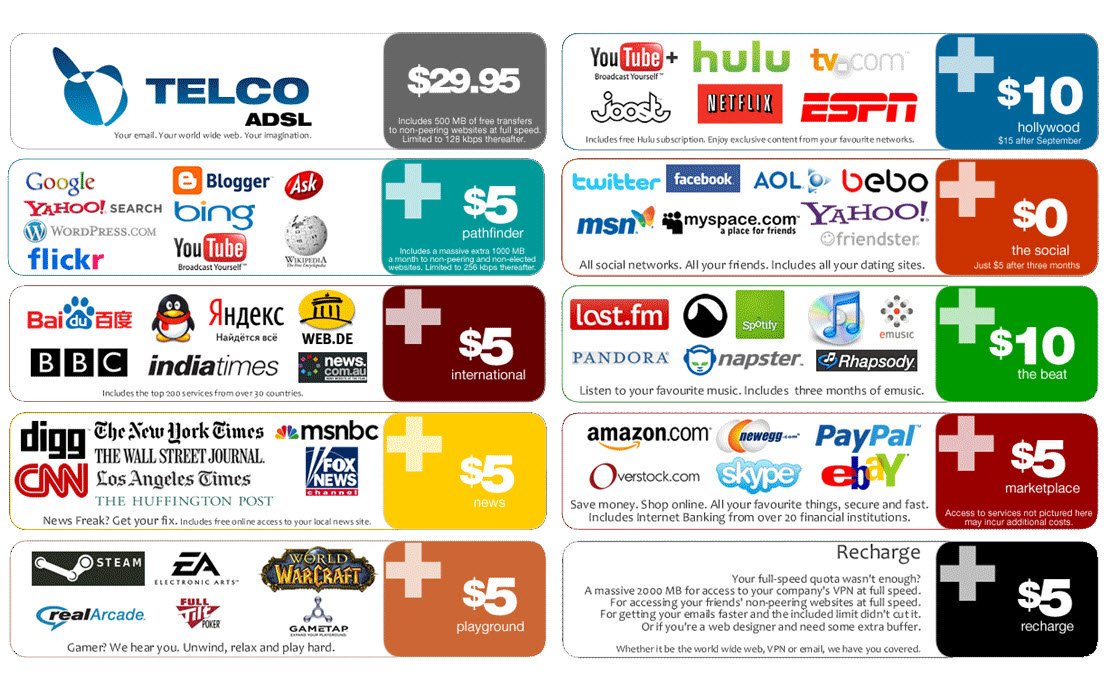Net Neutrality: what it is, and why you should care
If you've been on the internet at all the past week, there's a high chance that you've heard of something called "Net Neutrality", and you've also likely heard that there might be huge changes to your usage of the internet entirely. This post serves as a quick information briefing on what Net Neutrality is, what could happen if it's repealed, and the current events going on regarding it, and just general visibility to let the community in general be informed.What is this Net Neutrality thing?
The basic definition of network neutrality is simple: all internet traffic is considered and treated equally. It was established just a bit under three years ago, in February 2015. It prevented companies like Comcast Xfinity and AT&T U-verse from speeding up, or slowing down certain sites based upon content. If you remember, back in July 2017, mobile provider Verizon admitted to targeting Netflix traffic, and specifically throttling it, negatively affecting customers' use of Netflix. Going back to 2014, there were also issues with Comcast customers, and, that's right, Netflix users, as connections to Netflix were notoriously slow. Netflix then entered a legal deal with Comcast, in order to have Netflix connections be faster than they previously were. The 2014 incident was pre-net neutrality, and shows that before the law was enacted, certain sites like Netflix were indeed slowed, and had to specifically bargain with large telecommunication monopolies like Comcast to get fair speeds out to their customers.
In April 2017, the chairman of the Federal Communications Commission (FCC), Ajit Pai, revealed that he had plans to repeal net neutrality. It's worth noting that Pai was once the Associate General Counsel of Verizon Communications, an incredibly high up position with an ISP, who we've stated before as having throttled websites in the past.
Pai's statements on the matter included saying such things as "[the government] would be able to stop micromanaging the internet" and that the FCC and internet service providers would simply have to be "transparent about their practices so that consumers can buy a service plan that's best for them". Shortly after, Comcast began vocally supporting these statements, claiming that government regulation of the internet has been harming innovation and investments of Comcast. David Cohen, the company's Chief Diversity Officer, said that "customers would be clearly informed on our practices [...] Comcast maintains that it does and will not block, throttle, or discriminate against lawful content".
Within the movement for repealing net neutrality, also comes with power being given to the Federal Trade Commission. The FTC would then have the ability to legally charge internet service providers that were not made clear to customers.
You may notice, that within any of the claims made by Pai or Comcast, that equal traffic was never made the focus, instead putting emphasis on making sure these monopolies must be clear and transparent about what they do, but never laying down any solid rules about what they need to be transparent about or why. And, of course, if the FTC were to go after AT&T, Comcast, Verizon, Time Warner, or other assorted companies for not being transparent, these legal cases would find themselves taking years to make their way to court, allowing for them to have their way with their customers until a definitive legal ruling. Therein lies the first batch of unease and controversy with the repeal.
In short, net neutrality is a fairly new regulation, which allows for equal traffic between all sites while using the internet. The chairman of the FCC and former higher-up of Verizon wants to repeal it, however. This would allow less government interference with ISPs, but would also allow those ISPs to do what they wish, so long as they're "transparent".
Does repealing Net Neutrality have any benefits?
Spoiler alert: not really
From the inception of the internet, and up until 2015, Americans have gone without net neutrality. Ajit Pai claims that should we not have net neutrality anymore, more rural areas would be able to have more companies and providers, and it would allow for more competition and choice for the consumer. However, these smaller companies would also have to fight it out with established services, with years of experience and infrastructure refinements.
As a side note, I've spent thirty minutes researching a potential "pro" argument. I've not found many that seem reasonable. I've listed in the spoiler tag below arguments from other websites and blogs.
Green Garage Blog: While net neutrality allows for freedom of speech, the downside is that almost anything can be posted to the internet. This means that the cruelest or insensitive information imaginable can end up on the internet, and as a result, it can cause a lot of problems from people that otherwise wouldn’t be prone to being under the microscope of criticism. This means that people can post cruel, intimidating, or other harassing messages and often get away with it thanks to free speech legislation. So it can be a very toxic environment for a lot of people to put up with.
Vittana: Reduced income from internet uses limits infrastructure improvements.
There are certain businesses and high-use individuals who consume large amounts of bandwidth every month. If net neutrality was removed, these high-level consumers would be asked to pay more for what they consume. This added income could then be used to upgrade the infrastructure of each internet service provider, making it possible for advanced fiber networks to be installed in many communities.
AEI: But in many instances, fast lanes, zero-rating, and the like benefit customers. In separate research, both former FCC Chief Economist Michael Katz (with Ben Hermalin) and I (with Janice Hauge) showed that fast lanes benefit small content providers in their attempts to compete with established industry leaders. AEI scholar Roslyn Layton has shown that elderly and low-income consumers benefit from zero-rating services.
Vittana: Reduced income from internet uses limits infrastructure improvements.
There are certain businesses and high-use individuals who consume large amounts of bandwidth every month. If net neutrality was removed, these high-level consumers would be asked to pay more for what they consume. This added income could then be used to upgrade the infrastructure of each internet service provider, making it possible for advanced fiber networks to be installed in many communities.
AEI: But in many instances, fast lanes, zero-rating, and the like benefit customers. In separate research, both former FCC Chief Economist Michael Katz (with Ben Hermalin) and I (with Janice Hauge) showed that fast lanes benefit small content providers in their attempts to compete with established industry leaders. AEI scholar Roslyn Layton has shown that elderly and low-income consumers benefit from zero-rating services.
Basically, the only benefit would be if America's current economy wasn't dominated by monopolistic ISPs. Below is an interview with Ajit Pai, showing his perspective.
Scrapping these rules, Pai told Reason's Nick Gillespie, won't harm consumers or the public interest because there was no reason for them in the first place. The rationales were mere "phantoms that were conjured up by people who wanted the FCC for political reasons to overregulate the internet," Pai told Gillespie. "We were not living in a digital dystopia in the years leading up to 2015."
If left in place, however, the Title II rules could harm the commercial internet, which Pai described as "one of the most incredible free market innovations in history."
"Companies like Google and Facebook and Netflix became household names precisely because we didn't have the government micromanaging how the internet would operate," said Pai, who noted that the Clinton-era decision not to regulate the Internet like a phone utility or a broadcast network was one of the most important factors in the rise of our new economy.
Pai also pushed back against claims that he's a right-wing radical who's "fucking things up."
"[I ascribe to] the very radical, right-wing position that the Clinton administration basically got it right when it came to digital infrastructure."
What happens if/when this gets repealed, and what does this mean for you?
The worst part of this, is that there's no definitive answer of what WILL happen, only what CAN happen. What has people concerned, though, is the potential things that larger ISPs can do with this new power, should net neutrality be repealed. Internet service providers could slow access to specific sites, and speed up others, in theory, others specifically being sites who pay ISPs for faster access, and those partnered or in contracts with ISPs. Websites like Google, Amazon, Reddit, Etsy, Netflix, and many more have all broadcast their support of net neutrality, stating that without these rules in place thanks to net neutrality, internet providers would become gatekeepers to the internet, restricting what customers can see. Without definitive government restrictions, these companies could be free to split access to the internet into packages, like cable TV, indeed making true on the intention of lowering the cost of internet access, but also making it more difficult and expensive to see all of the internet, as you can right now.
Likely, what will happen, though everything is up in the air, is that certain ISPs will utilize what's called "fast lanes" and "zero rating". Fast lanes are sort of like what we talked about at the start, with Netflix and Comcast. Currently, these fast lanes and zero rating are used with mobile phone data. AT&T customers can watch DirecTV (owned by AT&T) via their mobile data, without it counting towards their monthly cap. These rules could be applied to home internet as well; if you're a Comcast user, and you want to watch Hulu (owned by NBC-Universal-Comcast), maybe your connection to Hulu will be lightning fast, thanks to these theoretical fast lanes, and they won't go towards your Comcast monthly 1 Terabyte home cap. But what if you want to watch Netflix? Either Netflix will have much lower picture quality, or take a longer time to connect to. And if Netflix pays a fee, or gets into a contract once again with Comcast, then that potentially means that Netflix's increased costs move down to the consumer, who also now has to pay more for a service as well.
What can we do?
The only thing left to do is let your voice be heard. Social media has exploded without people decrying the impending repeal of net neutrality, and the negatives that it would entail, to the point of where the majority of Reddit has been plastered with net neutrality posts.
You can learn more at the links below. Hopefully this is helpful in describing what net neutrality is, and why it shouldn't be taken away.








